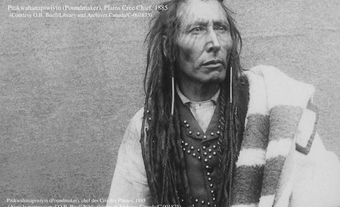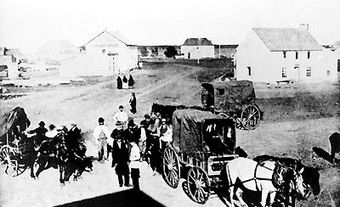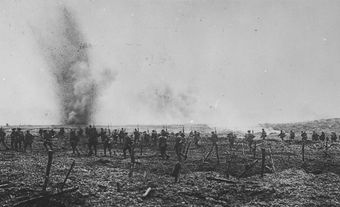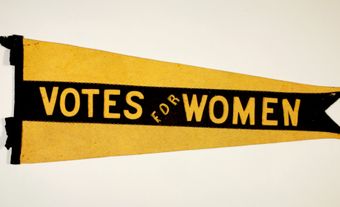Alberta
Alberta, the westernmost of Canada's three Prairie provinces, shares many physical features with its neighbours to the east, Saskatchewan and Manitoba. The Rocky Mountains form the southern portion of Alberta's western boundary with British Columbia.
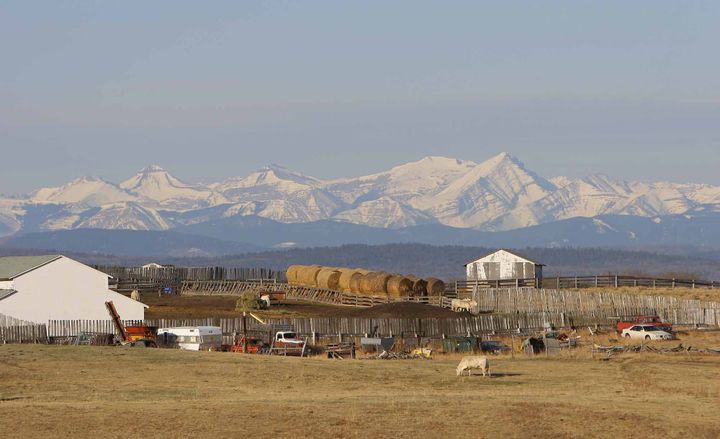
-
July 24, 1754

Government and Politics
Henday in the West
Anthony Henday reached Fort Paskoyac; he later reached a Blackfoot camp southwest of present-day Red Deer, being likely the first European to set foot in territory that became Alberta.
-
October 18, 1840
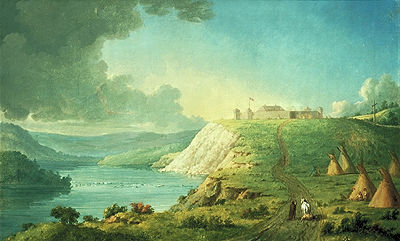
Government and Politics
First Cleric in Alberta
Robert Rundle arrived at Fort Edmonton, the first permanent cleric in what became Alberta.
-
July 15, 1870
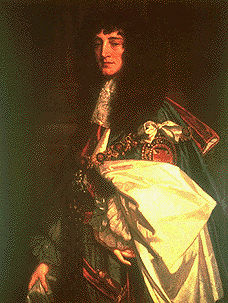
Government and Politics
Transfer of Rupert's Land
The British Crown officially transferred Rupert's Land and the North-Western Territory to Canada. These lands comprise present-day Manitoba, most of Saskatchewan, southern Alberta, southern Nunavut, and northern parts of Ontario and Québec.
-
October 01, 1874
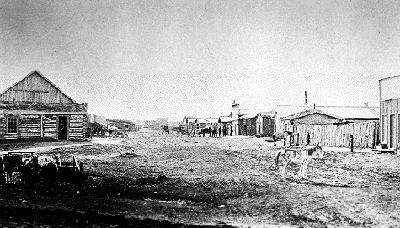
Government and Politics
Establishment of Fort Macleod
One hundred and fifty North-West Mounted Police established the first police post in what is now Alberta on an island in the Oldman River, and named it after Assistant Commissioner James F. Macleod.
-
August 23, 1876
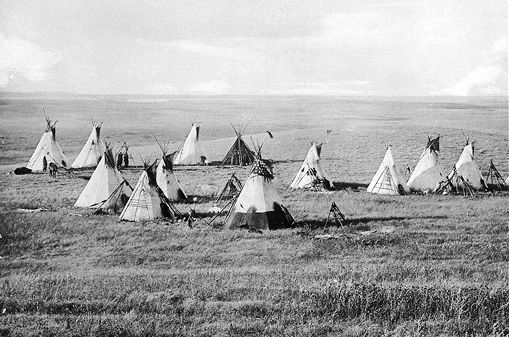
Government and Politics Indigenous Peoples
Treaty 6
Treaty 6 was signed at Carlton and at Fort Pitt with the Plains Cree, Woodland Cree and Assiniboine. It ceded an area of 120,000 sq. miles of the plains of Saskatchewan and Alberta.
-
September 22, 1877

Government and Politics Indigenous Peoples
Treaty 7
Treaty 7 was signed at Blackfoot Crossing in southern Alberta by the Siksika, Kainai, Piikani, Tsuut'ina and Stoney. Canadian officials understood that by the treaty First Nations surrendered some 35,000 sq miles of land to the Crown in return for reserves, payments and annuities.
-
May 08, 1882

Government and Politics
Western Provisional Districts
Land acquired from the Hudson’s Bay Company in 1870 was divided into four administrative districts by the federal government: Alberta, Assiniboia, Athabasca and Saskatchewan. The districts, designed "for the convenience of settlers and for postal purposes," were roughly equal in size and natural resource distribution.
-
March 27, 1883
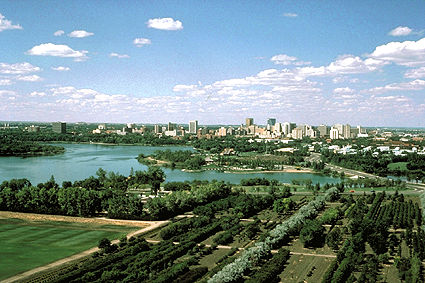
Government and Politics
Capital of the North-West Territories Shifts
The capital of the North-West Territories (the future Alberta and Saskatchewan) shifted from Battleford to Pile O' Bones (Regina). Cree hunters harvested buffalo in the region and stacked the bones of their quarry in piles roughly 2 m tall by 12 m in diameter. The Cree believed that buffalo herds would return to visit these bones, and so named the area Oskana-Ka-asateki, "the place where bones are piled."
-
June 01, 1883

Communication and Transportation
CPR Arrives in Alberta
The Canadian Pacific Railway arrived in Alberta, at Medicine Hat.
-
January 01, 1895

Resources and Environment
Waterton Lakes National Park Established
Waterton Lakes National Park was established. The park is situated in the southwestern corner of Alberta on the Canada–US border. In 1932, the park was united with Montana's Glacier National Park to create the world's first international peace park.
-
June 21, 1899

Government and Politics Indigenous Peoples
Treaty 8
Cree, Beaver, Chipewyan and Slavey First Nations ceded territory south and west of Great Slave Lake in northern Alberta to the federal government in Treaty 8.
-
September 01, 1900

Resources and Environment
Minto Opens Canal
Governor General Lord Minto opened an irrigation canal, which ran 184 km between Kimball and Lethbridge, Alberta.
-
April 29, 1903

Resources and Environment
Frank Slide
A rockslide (commonly called the Frank Slide) from Turtle Mountain, NWT (Alta), onto the town of Frank killed at least 70 people, the most disastrous rockfall in Canadian history.
-
October 08, 1904

Government and Politics
Edmonton Incorporated
First established in 1795 as a Hudson’s Bay Company post, Edmonton was on this day incorporated as a city. The following year, it was chosen as capital for the freshly minted Province of Alberta. Today, it is the northernmost North American city with a population over one million.
-
February 27, 1905

Government and Politics
Sifton Resigns
Interior minister Clifford Sifton resigned from the federal Cabinet in a dispute over guarantees for separate schools in the Act making Alberta and Saskatchewan provinces of Canada.
-
July 18, 1905

Government and Politics
Dominion Act
The Dominion Act created the provinces of Alberta and Saskatchewan, effective September 1. Regina and Edmonton, respectively, became the capitals on July 20.
-
September 01, 1905
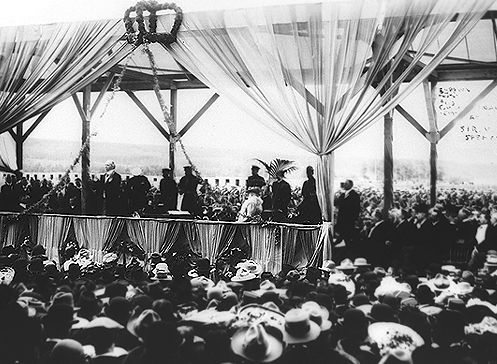
Government and Politics
Alberta and Saskatchewan Become Provinces
Alberta and Saskatchewan entered Canada as the 8th and 9th provinces by two federal Acts which received royal assent on 20 July. Alberta's boundary with Saskatchewan was set at 110°, though Albertans wanted 107°. The Acts (Autonomy Bills) declared that the West was to have non-denominational schools.
-
September 23, 1908
Communication and Transportation
University of Alberta Opens
The University of Alberta at Edmonton opened, with 37 students.
-
May 26, 1910

Government and Politics
A. Sifton Becomes Premier of Alberta
Arthur Sifton became premier of Alberta. He held together a divided party and was an effective premier, a strong leader and a skilled administrator.
-
December 09, 1910
Resources and Environment
Bellevue Mine Explosion Kills 31
An explosion in a coal mine at Bellevue, Alta, killed 31 men. It was caused in part by the negligence of the coal company.
-
January 01, 1911
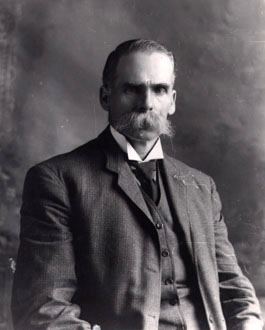
Government and Politics
Oliver's Immigration Policy
Alberta's Frank Oliver wanted tighter controls on immigration. He became the Liberal government's Minister of the Interior in 1905. Oliver was staunchly British, and his policies favoured nationality over occupation. By 1911, he was able to assert that his immigration policy was more "restrictive, exclusive and selective" than his predecessor's.
-
January 11, 1911
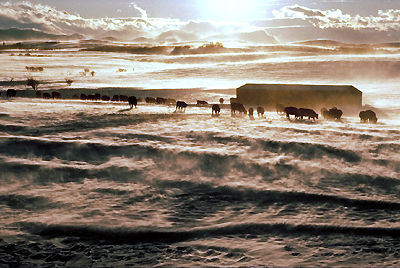
Resources and Environment
Alberta's Record Low
Alberta's record low temperature of -60.6° C was recorded at Fort Vermilion.
-
May 14, 1914

Oil Sands
Oil Discovery at Turner Valley
A major oil discovery at Turner Valley, southwest of Calgary, ushered in the oil age in Alberta.
-
June 19, 1914
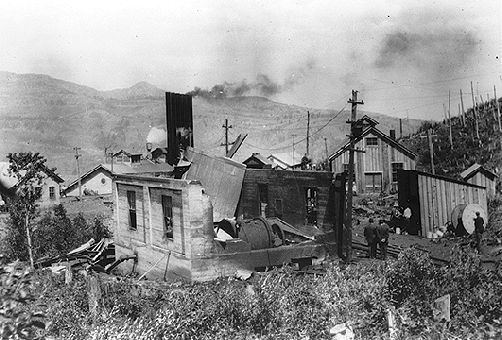
Resources and Environment
Hillcrest Mine Explosion
An explosion of methane gas at Hillcrest, Alta, killed 189 men in Canada's worst mining disaster.
-
February 26, 1915

Government and Politics
McClung's Petition
Suffragist Nellie McClung presented the Alberta legislature with a petition demanding that women be given the right to vote. The right was granted in municipal elections 2 months later.
-
April 19, 1916
Government and Politics
Alberta Women Get Vote
Alberta women won the rights to vote and to hold provincial office.
-
July 01, 1916
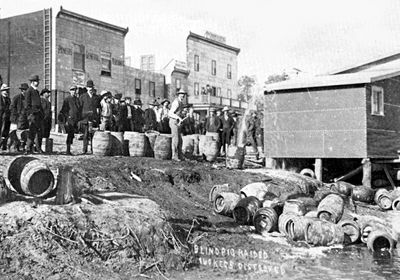
Government and Politics
Prohibition in Alberta
The Prohibition of the sale of alcohol came into effect in Alberta. The law proved unenforceable.
-
June 07, 1917
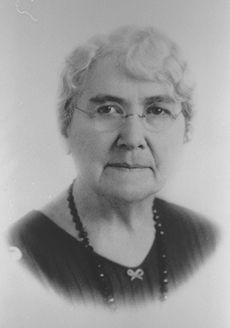
Government and Politics
First Elected Women
Louise McKinney and Roberta MacAdams were the first women in Canada elected to a provincial legislature, in Alberta.
-
May 01, 1919

Government and Politics
Sympathy Strike In Alberta
Two thousand workers in Edmonton and Calgary went on strike in support of the strikers in the Winnipeg General Strike.
-
March 01, 1920
Government and Politics
Alberta Penitentiary Closes
The federal government ordered the Alberta Penitentiary in Edmonton closed down and the 147 prisoners moved to Prince Albert, Saskatchewan or Stony Mountain, Manitoba.
-
July 18, 1921
Government and Politics
Parlby Elected
Irene Parlby was elected to the Alberta Legislature, representing Lacombe in the United Farmers of Alberta government. She was subsequently named to Cabinet, as minister without portfolio. Parlby was only the second woman in the British Empire to hold ministerial office. She was particularly active on issues related to public health care, improved wages for working women and married women's property rights.
-
July 18, 1921

Government and Politics
United Farmers of Alberta Win
The United Farmers of Alberta won the provincial election, forming the government until 1935. They chose Herbert Greenfield as premier.
-
January 01, 1922

Resources and Environment
Wood Buffalo National Park Established
Wood Buffalo National Park was established to protect the last herd of wood bison. Canada's largest national park straddles the Alberta-Northwest Territories border. It was declared a world heritage site in 1983.
-
May 01, 1922
Sports and Culture
First Alberta Radio Broadcast
Radio station CJCA made its first broadcast in Edmonton, Alberta.
-
May 24, 1924

Government and Politics
End of Prohibition in Alberta
Prohibition ended in Alberta when the Alberta Liquor Act was amended. Albertans had chosen to have the liquor trade controlled by the government.
-
June 26, 1925

Government and Politics Resources and Environment
Drumheller Strike
A violent confrontation between police and strikers effectively ended the strike of the miners in Drumheller, Alta.
-
November 23, 1925
Government and Politics
Premier Greenfield Resigns
Premier Herbert Greenfield, ill and often absent, resigned as premier of Alberta. He was succeeded by John Brownlee.
-
September 14, 1926

Government and Politics
King Forms Minority
In a federal election the Liberals and Conservatives reversed fortunes with the Liberals winning 116 seats and the Conservatives 91. The Progressives won 13 seats and the UFA 11; there were 14 others. King became prime minister again, forming a minority.
-
July 28, 1930

Government and Politics
Conservatives Win Election
In a federal election, the Conservatives won a majority with 137 seats to the Liberals' 91. The UFA held 10 and the Progressives dropped to 2. R.B. Bennett became prime minister.
-
June 24, 1932

People
Birth of Mel Hurtig
Publisher and nationalist Mel Hurtig, who first published The Canadian Encyclopedia (1985 and 1988), was born in Edmonton, Alberta. Hurtig also co-founded the Council of Canadians and wrote a number of books on Canadian society and politics.
-
August 30, 1933
People
Birth of Don Getty
Former Alberta premier and professional football player Don Getty was born in Westmount, Québec. Getty played quarterback for the Edmonton Eskimos for 10 seasons, leading the team to Grey Cup championships in his first two seasons, 1955 and 1956. A successful career in the oil industry followed before he made the transition to politics, winning a seat in the Alberta Legislature as a member of the Conservative Party in 1967. Getty became premier of Alberta in 1985 and led the province until 1992.
-
August 22, 1935

Government and Politics
Social Credit Victory in Alberta
Charismatic Bible-thumping William Aberhart led the Social Credit Party to victory in the Alberta provincial elections. He was sworn in on September 3. The party dominated Alberta politics until 1971.
-
March 21, 1940

Government and Politics
Social Credit Retain Power
Premier William Aberhart's Social Credit Party won 36 of 57 seats in Alberta's provincial election.
-
May 31, 1943
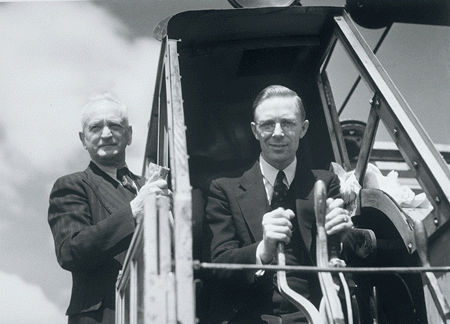
Government and Politics
Manning Becomes Premier
Ernest Charles Manning succeeded William Aberhart as Social Credit premier of Alberta.
-
February 13, 1947

Oil Sands
Hunter Strikes Oil at Leduc
Vern "Dry Hole" Hunter struck oil near Leduc, Alberta. The discovery ended a long decline in the Alberta oil industry, began an era of prosperity for the province and spared Canada dependence on foreign oil.
-
January 01, 1949
Indigenous Peoples
First Nations Win Right to Vote Provincially
Except in Nova Scotia and Newfoundland, Status Indians had been barred from voting provincially. Beginning with British Columbia in 1949 and ending with Quebec in 1969, First Nations peoples gradually win the right to vote in provincial elections without losing status or treaty rights.
-
September 24, 1950
Resources and Environment
“Great Smoke Pall”
Drifting sulphur particles from British Columbia and Alberta forest fires caused the sun and moon to look blue or violet throughout areas of North America and Western Europe. The “great smoke pall” of September 1950 was unique in its scope and intensity.
-
October 31, 1950
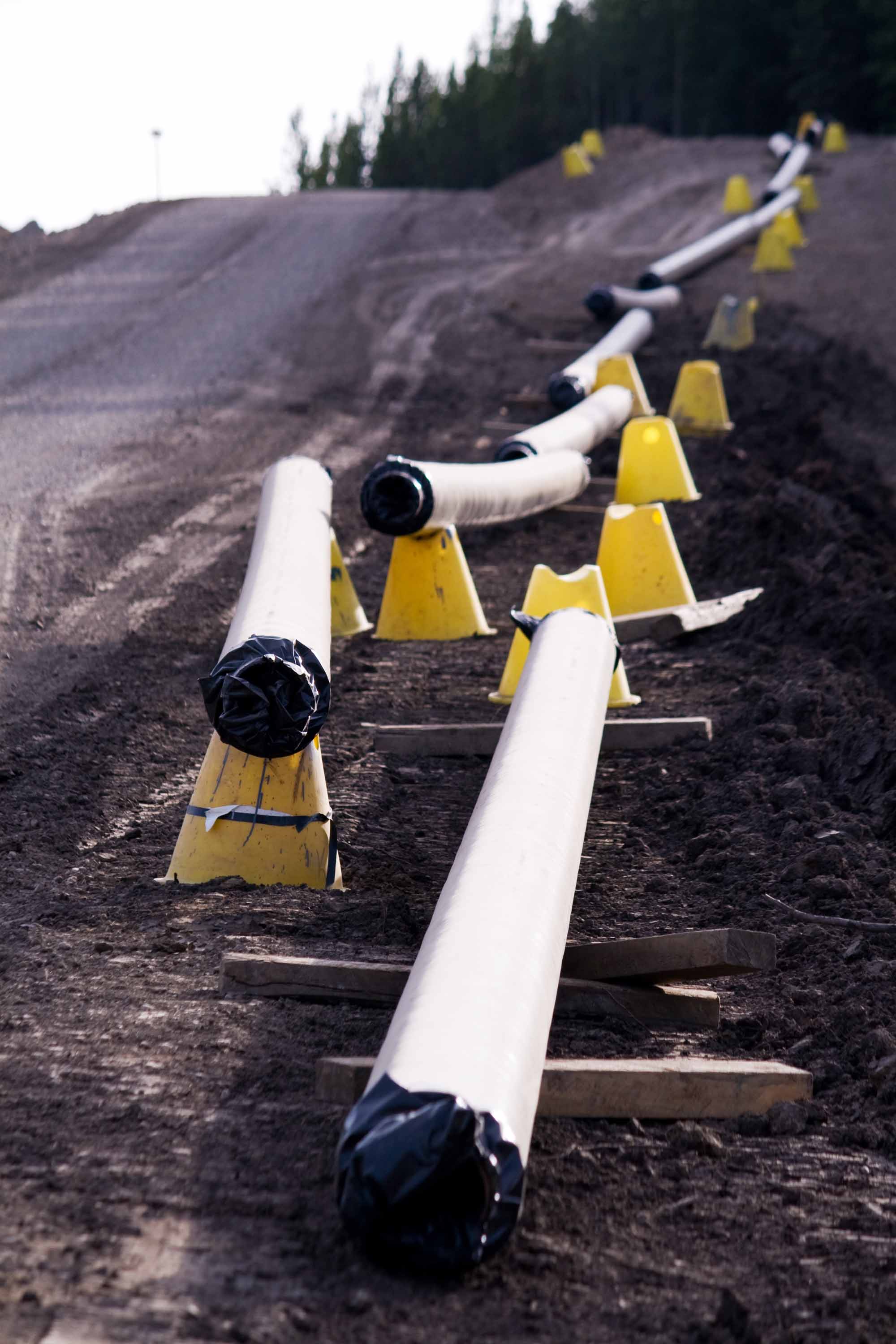
Oil Sands
Pipeline Completed
The 1770 km oil pipeline from Edmonton to the Great Lakes was completed, linking Canada's gas fields with the markets of central Canada. In 1958 Alberta gas finally reached Toronto and imports of Texas gas ended.
-
April 24, 1952

Oil Sands
First Alberta Oil in Ontario
The first shipment of oil from Alberta arrived in Ontario via pipeline and freighter.
-
September 15, 1956

People
Reports of Canada’s First Successful Open-Heart Surgery
Dr. John Carter Callaghan performed Canada’s first successful open-heart surgery on 10-year-old Susan Beattie, who had a hole in her heart. On 15 November 1956, the Edmonton Journal described the event as “the greatest single advance in heart surgery in recent years.” Callaghan was also known for co-developing the portable artificial pacemaker.
-
December 15, 1956

People
Reports of Canada’s First Blue-Baby Operation
On 15 December 1956, the Edmonton Journal reported on a rare heart operation. An 18-month-old baby, Sherry Anderson, suffered from blue-baby syndrome, a condition that causes skin to look bluish due to a shortage of oxygen in the blood. Dr. John Carter Callaghan and his team performed an operation to fix this condition for the first time in Canada.
-
September 19, 1960
Sports and Culture
University of Calgary Founded
The University of Alberta opened a new 130 ha campus on the outskirts of Calgary - later to become the University of Calgary.
-
May 27, 1963
Sports and Culture
NAIT Opens
The Northern Alberta Institute of Technology opened in Edmonton.
-
March 20, 1965

Government and Politics
Peter Lougheed Elected Leader
Calgary lawyer Peter Lougheed, 36, was elected leader of the Alberta Progressive Conservative Party. He was first elected to the legislature in 1967.
-
April 06, 1967
Government and Politics
Canada's First Ombudsman
George McClellan was named ombudsman of Alberta, Canada's first.
-
May 28, 1969
Communication and Transportation
Alberta Resources Railway
Alberta premier Harry Strom opened the Alberta Resources Railway, a 378 km line from Grande Prairie north to Solomon.
-
August 30, 1971
Government and Politics
Conservatives Win Alberta
Peter Lougheed's Conservatives ended 36 years of Socred government in Alberta by winning a majority government in a general election.
-
July 02, 1974
Government and Politics
Ralph Steinhauer Appointed Lieutenant-Governor
Ralph Steinhauer was appointed lieutenant-governor of Alberta, the first Indigenous person to hold vice-regal office in Canada.
-
February 04, 1975

Oil Sands
Oil Sands Development
The Alberta, Ontario and federal governments agreed to invest $600 million in the Syncrude Canada project to develop the Athabasca oil sands near Fort McMurray, Alberta.
-
September 01, 1981

Oil Sands
Energy Pricing Deal
Alberta premier Peter Lougheed and PM Pierre Trudeau signed an energy-pricing agreement.
-
September 25, 1985
Sports and Culture
Tyrrell Museum Opens
Alberta Premier Peter Lougheed officially opened the $30-million Tyrrell Museum of Palaeontology at Drumheller.
-
November 01, 1985

Government and Politics
Peter Lougheed Steps Down
Peter Lougheed stepped down as premier of Alberta. Don Getty became premier.
-
February 23, 1986
Communication and Transportation
Train Disaster at Hinton
Twenty-three people died in a head-on collision between a CN freight train and a Via Rail passenger train at Hinton, Alta.
-
May 08, 1986

Government and Politics
Getty's Majority Reduced
In a worsening economic climate, Premier Don Getty of Alberta saw the Conservative majority reduced from 75 of 79 seats to 61.
-
June 09, 1995
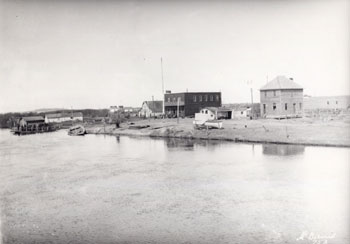
Resources and Environment
Floods in Medicine Hat
Floods in Medicine Hat, Alta, forced some 5000 people from their homes.
-
December 19, 1995

Resources and Environment
Happy Chickens
Alberta chicken producer Rod Chernos was honoured by the Society for the Prevention of Cruelty to Animals. He believed "a happy chicken is a tasty one."
-
April 28, 1999
Government and Politics
Taber Killings
A 14-year-old boy armed with a .22 calibre rifle shot two students at W.R. Myers High School in Taber, Alberta. One died and the other was critically injured. The shooting occurred just eight days after the Colorado massacre.
-
May 23, 1999
Sports and Culture
Owen Hart Killed
Alberta-born professional wrestler Owen Hart fell 15 m to his death during a performance in Kansas City. His wife brought a suit against the wrestling federation for endangering Hart's life in pursuit of TV ratings.
-
November 02, 1999
Government and Politics
Compensation for Sterilization
The Alberta government announced that it would compensate 242 people who had been sterilized against their will as part of a policy of sterilizing mentally handicapped children from 1929 to 1972.
-
April 19, 2000

Government and Politics Resources and Environment
Ludwig Found Guilty
An Alberta judge found activist Wiebo Ludwig guilty of a 1998 gas-well bombing. Ludwig claimed that the wells were responsible for deadly pollution in the area.
-
May 11, 2000
Government and Politics
Alberta Bill 11 Passes
Alberta's Health Care Protection Act (Bill 11) passed. Seen by the government as an act to preserve the health care system, Bill 11 was intended to expand the role of private surgery facilities.
-
July 14, 2000

Government and Politics
Stockwell Day Chosen Leader
The Canadian Alliance elected former Alberta Treasurer Stockwell Day as leader, replacing party founder Preston Manning.
-
May 20, 2003

Resources and Environment
Mad-cow Disease Hits Canada
Mad-cow disease (bovine spongiform encephalopathy) was discovered in a northern Alberta farm, threatening the $7.6 billion beef industry.
-
January 20, 2005

Government and Politics
Norman Kwong Becomes Lieutenant Governor
Norman Kwong succeeded Lois Hole as Alberta's 16th lieutenant governor, the first Chinese Canadian to hold the position in Alberta.
-
April 12, 2005

Oil Sands
Chinese Begin Investing in Alberta’s Oil Sands
China National Offshore Oil Corp (or CNOOC) is the first Chinese company to invest in Alberta’s oil sands with the purchase of a 16.7 per cent share of MEG Energy Corp. China's two other state-controlled oil companies, PetroChina and Sinopec, would also purchase shares in other oil sand companies by 2009.
-
December 14, 2006

Government and Politics
Stelmach Sworn In
Ed Stelmach was officially sworn in as the new premier of Alberta, replacing out-going premier Ralph Klein.
-
October 21, 2009
Government and Politics
Alberta WCB Workers Held Hostage
A disgruntled claimant held 8 Workers Compensation Board employees hostage at gunpoint for nearly 10 hours. The event ended peacefully when the hostage-taker surrendered to police.
-
April 12, 2010

Oil Sands
Chinese Oil Producer Buys Shares in Syncrude
Sinopec Corp, China's second-largest oil producer, paid $4.65 billion for a 9.03 per cent share of Syncrude. The purchase more than doubled that country’s presence in Alberta's oil sands since its companies began investing there in 2005.
-
May 11, 2010
Government and Politics
Ethell Appointed Lieutenant-Governor
The Honourable Donald S. Ethell was installed as the 17th Lieutenant Governor of Alberta.
-
June 16, 2010
Indigenous Peoples
First National Truth and Reconciliation Event
The Truth and Reconciliation Commission of Canada hosts its first national event, in Winnipeg, MB. It explores the history of the residential school system, the experience of former students and their families and the impact such institutions had on Indigenous peoples in Canada. Over the next five years, six more events follow in cities around the country, with a national closing ceremony in Ottawa.
-
September 28, 2010
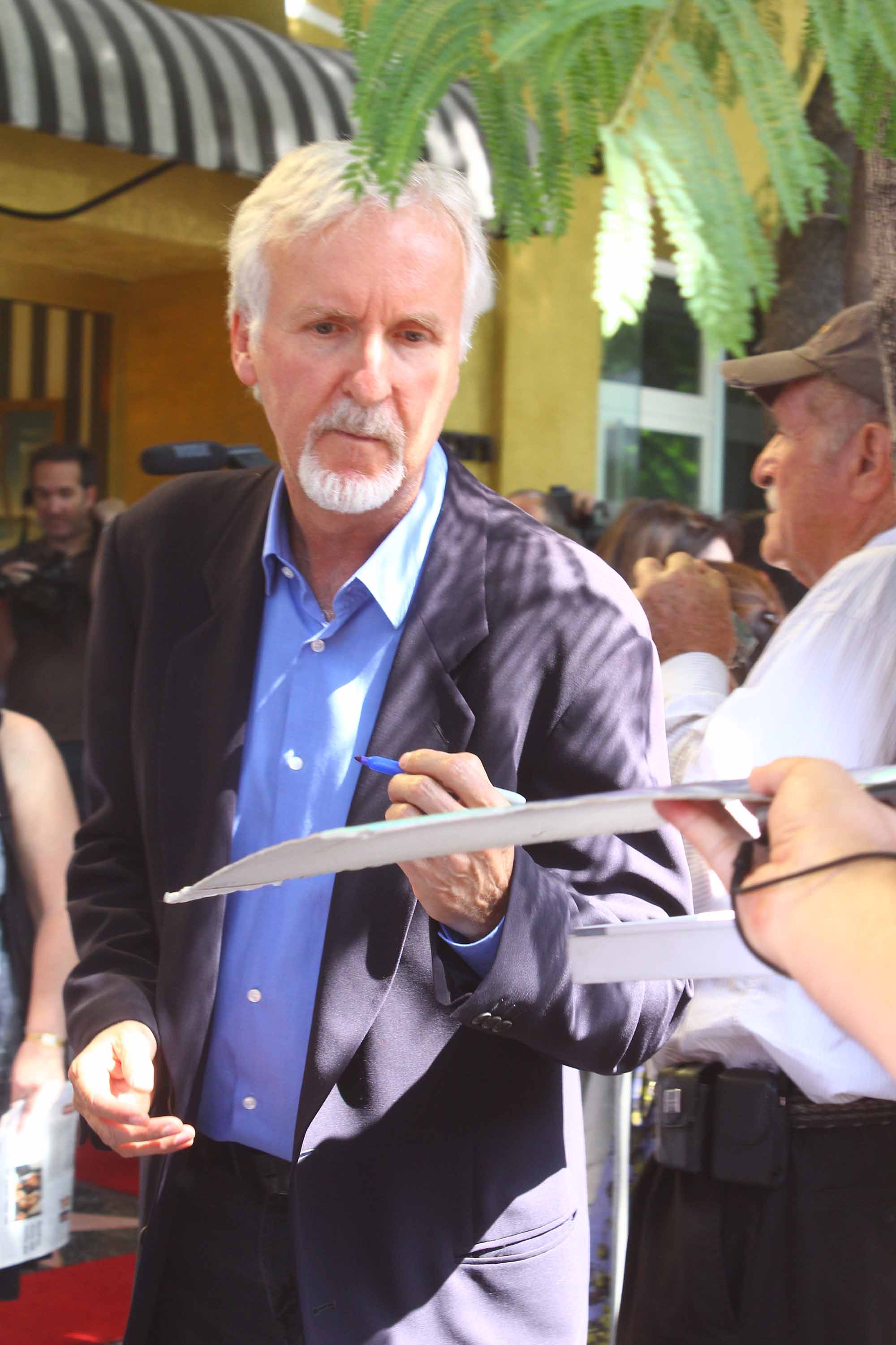
Oil Sands
Cameron Tours Alberta Oilsands
Canadian-born film director James Cameron toured the industrial development near Fort McMurray, speaking with First Nations representatives and oil industry officials and ultimately concluding that the issue of environmental stewardship in the area is complex and far-reaching.
-
June 08, 2013

Resources and Environment
Alberta Flood Begins
Torrential rains in both northern and southern Alberta flood the landscape and mire cities and townships. As many as 75,000 people are evacuated from Calgary as the Bow and Elbow rivers swell. Waters begin to recede a full two weeks after rains began.
-
May 05, 2015
Government and Politics
NDP Wins Majority in Alberta Election
In a remarkable electoral upset, the Alberta New Democratic Party won a majority government, ousting the long-reigning Progressive Conservative Party. NDP leader Rachel Notley replaced Jim Prentice as premier. The Tories lost support with voters on economic issues in the lead-up to the election and finished in third place on election night. The Wildrose Party became the Official Opposition.
-
February 26, 2016

People
Death of Don Getty
Former Alberta premier and professional football player Don Getty died in Edmonton, Alberta, at age 82. Getty played quarterback for the Edmonton Eskimos for 10 seasons, leading the team to Grey Cup championships in his first two seasons, 1955 and 1956. A successful career in the oil industry followed before he made the transition to politics, winning a seat in the Alberta Legislature as a member of the Conservative Party in 1967. Getty became premier of Alberta in 1985 and led the province until 1992.
-
May 03, 2016

Disasters Oil Sands
Fort McMurray Wildfire
A raging forest fire, which had begun southwest of Fort McMurray, Alberta, crossed the Athabasca River toward the city, prompting the evacuation of more than 80,000 residents. The fire eventually covered 500,000 hectares, destroyed 2,400 structures (about 10 per cent of Fort McMurray), and forced oil sands producers to temporarily shut down their operations. It was called the costliest natural disaster in Canadian history.
-
August 03, 2016

People
Death of Mel Hurtig
Publisher and nationalist Mel Hurtig, who first published The Canadian Encyclopedia (1985 and 1988), died in Vancouver, British Columbia. The Edmonton native also co-founded the Council of Canadians and wrote a number of books on Canadian society and politics.
-
September 03, 2016

People
Death of Norman Kwong
Norman “Normie” Kwong made history as the first Chinese Canadian to play in the Canadian Football League, the youngest player to win the Grey Cup, and the first Chinese Canadian lieutenant-governor of Alberta. He died in Calgary at the age of 86.
-
June 08, 2017
People
Death of LeRoy Fjordbotten
LeRoy Fjordbotten, Member of the Legislative Assembly of Alberta and cabinet minister for the Progressive Conservative governments of Peter Lougheed, Don Getty and Ralph Klein (1979–93), died at the age of 78.
-
September 30, 2017
People
Edmonton Terror Attack
A man drove a car into a routine police roadblock in downtown Edmonton, Alberta, striking Constable Mike Chernyk at high speed. The driver then got out of the car and attacked the officer with a knife before fleeing the scene. He was later stopped in a U-Haul van at a police checkpoint but sped away, hitting four pedestrians before he was arrested by pursuing police officers. (In the days after the attack, the victims were all expected to survive.) A Daesh flag was found in the car of the suspect, who was identified as 30-year-old Abdulahi Hasan Sharif, a Somali refugee who had been interviewed by the RCMP in 2015 for supporting extremist views. (See also Terrorism and Canada.)
-
October 01, 2017
People
Four Canadians Killed in Las Vegas Mass Shooting
Among at least 59 people killed in the mass shooting perpetrated by Stephen Paddock at a music festival in Las Vegas, Nevada, were four Canadians: Jordan McIldoon of Maple Ridge, British Columbia; Jessica Klymchuck of Valleyview, Alberta; Calla Medig of Jasper, Alberta; and Tara Roe of Okotoks, Alberta. Several Canadians were among the more than 500 people injured in the attack, which was described as the largest mass shooting in modern United States history.
-
October 05, 2017

Oil Sands
Energy East Pipeline Project Cancelled
TransCanada announced that it had cancelled plans to build the Energy East pipeline, which would have carried crude oil from Alberta and Saskatchewan to refineries in Québec and New Brunswick. From there, oil would have been exported to other countries. The company cited changing market conditions and delays in assessments carried out by the National Energy Board as reasons for its decision. The project’s supporters, including premiers Rachel Notley and Brad Wall, expressed disappointment and criticized the federal government’s approach to the review process. Energy East’s opponents, including municipalities in Québec and Indigenous communities along the proposed path of the pipeline, hailed it as a victory.
-
February 19, 2019

Resources and Environment
“United We Roll” Convoy Advocates for Energy Sector Support
A convoy of almost 200 vehicles that left Red Deer, Alberta, on 14 February arrived in Ottawa, where it held pro-oil and pro-pipeline protests against the Trudeau government. A GoFundMe page helped raise more than $130,000 to support the convoy.
-
May 01, 2021

People
Alberta has Highest Per-capita COVID-19 Cases in Canada
For the third day in a row, Alberta set a record for new daily COVID-19 cases, with 2,433. With a seven-day rolling average of 440.5 daily cases per million people, Alberta had the highest per capita infection rate in Canada. It was also higher than any state in the US.
-
July 28, 2021

Government and Politics
Alberta Announces New COVID-19 Policies
Though there had been a sharp rise in COVID-19 cases in Alberta since the province lifted most public health restrictions on 1 July, Alberta’s chief medical officer of health, Dr. Deena Hinshaw, announced a further loosening of restrictions. With 65 per cent of eligible Albertans fully vaccinated against COVID-19, health minister Tyler Shandro said that lifting many remaining restrictions was “the inevitable next step.” However, many were critical of the move. Noel Gibney, a professor emeritus at the University of Alberta, said that it went “against all basic principles of public health” and made “absolutely no medical sense.”
-
September 15, 2021

Government and Politics
Alberta Declares State of Emergency Due to COVID Spread
With more than 18,000 active COVID-19 cases — the most of any province — Alberta premier Jason Kenney declared a state of public health emergency. The number of ICU admissions (212) set a pandemic record in Canada. About 90 per cent of ICU patients were unvaccinated. By 30 September, the province had 247 COVID cases in ICU. It then began to receive emergency medical staff from the Red Cross, the Canadian Armed Forces, and Newfoundland and Labrador.
-
September 20, 2021
Government and Politics Indigenous Peoples
First Openly Two-Spirit MP Elected
Blake Desjarlais, of Cree and Métis descent and originally from the Fishing Lake Métis Settlement in northwestern Alberta, became Canada’s first openly two-spirit Member of Parliament when he was elected to represent Edmonton Griesbach.
-
October 18, 2021
.jpg)
Government and Politics People
Calgary and Edmonton Elect First Female Mayor and First Racialized Mayor, Respectively
After campaigning on a platform to increase Calgary’s public transportation and property tax revenue, former city councillor Jyoti Gondek won a landslide victory with 45 per cent of the vote to become Calgary’s first female mayor. Meanwhile, former Edmonton city councillor and federal cabinet minister Amarjeet Sohi also took 45 per cent of the vote in Edmonton’s municipal elections to become the first racialized person to be elected mayor in the city’s history.
-
October 25, 2021
.jpg)
Government and Politics
Jyoti Gondek becomes Calgary’s First Female Mayor
Jyoti Gondek, a former community consultant and academic, was sworn in as the first female mayor in Calgary’s history. Gondek had won election with 45 per cent of the vote on 18 October. She said that with her victory — coupled with that of Amarjeet Sohi, a Sikh immigrant from India, in the Edmonton mayoral election on the same day — Albertans were making an important statement: “We have normalized now the idea of women and people of colour being in senior leadership positions. I am happy that the population sees itself reflected in its local government.”
-
October 11, 2022

Government and Politics
Danielle Smith Succeeds Jason Kenney as UCP Leader and Alberta Premier
Danielle Smith — a broadcaster and former leader of the Wildrose Party, who made headlines in 2014 after defecting to the Progressive Conservatives — was elected leader of the United Conservative Party following Jason Kenney’s resignation. Smith won with 53.8 per cent of the vote on the sixth ballot. She was sworn in as premier on 11 October but lacked a seat in the legislature until she won a by-election in November 2022.
-
June 22, 2024

Government and Politics
Naheed Nenshi Elected Leader of Alberta NDP in Landslide Win
Former Calgary mayor Naheed Nenshi won the leadership of the Alberta NDP with 86 per cent of the vote on the first ballot. The party’s membership increased by a factor of five to more than 85,000, and the turnout for the leadership vote was a remarkable 85.6 per cent. Nenshi did not have a seat in the legislature, so he appointed house speaker Christina Gray as the leader of the Opposition and named Rakhi Pancholi as deputy leader. Nenshi then turned his attention to winning a seat in the legislature.


